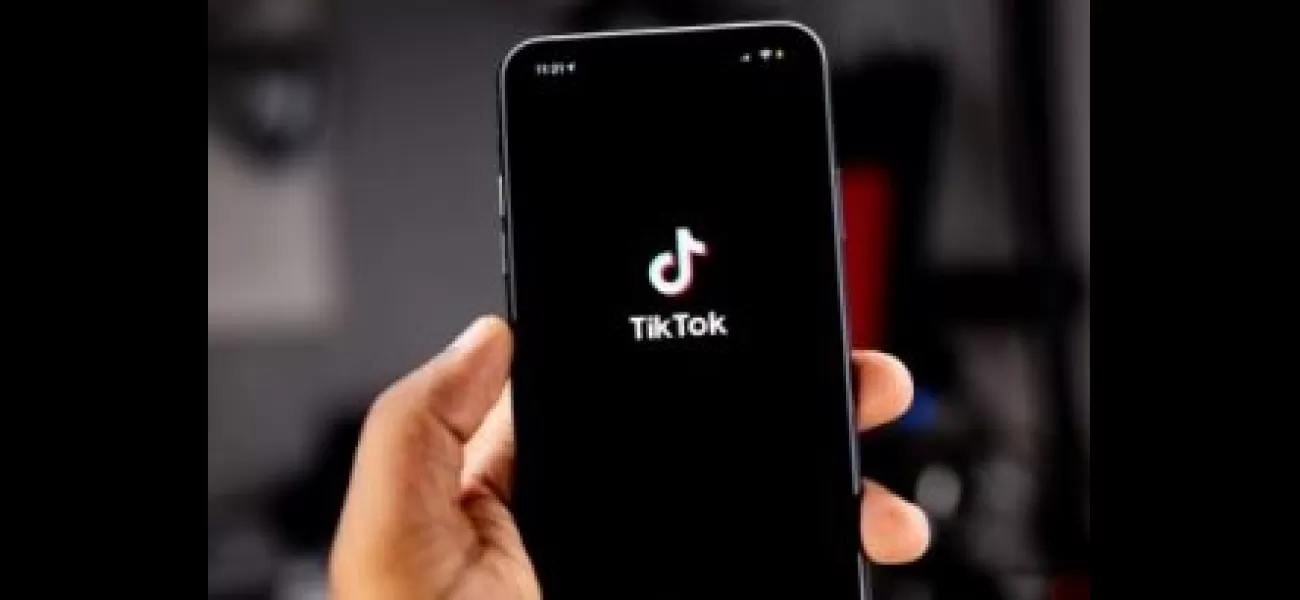TikTok dispute escalates with new law, sparking another clash between Beijing and Washington. What's next in the battle?
TikTok is preparing to challenge a US law that would require it to disconnect from its Chinese parent company, amid tensions between the US and China.
April 26th 2024.

TikTok, the popular social media platform, is preparing to defend itself against a newly passed U.S. law that would require the company to cut ties with its Chinese parent company. This move is seen as a response to the ongoing rivalry between the U.S. and China, which has put the future of this beloved online platform at risk for American youth.
Chinese authorities have indicated that they believe TikTok should fight back against what they see as a "robbers" act by U.S. lawmakers who are trying to take away all the good things that belong to others. If a legal challenge is unsuccessful, experts predict that Chinese authorities will not allow a sale of TikTok's U.S. business, as it would be seen as a surrender to Washington. This could set a dangerous precedent for future actions against other China-related apps, such as the popular e-commerce platform Temu, and could even encourage other countries to follow suit.
Alex Capri, a senior lecturer at the National University of Singapore, believes that Beijing may not want to set a "bad precedent" by giving in to the U.S. demands. As he puts it, "If Beijing gives in, where does it end?" In its first official response to the new law, ByteDance, the parent company of TikTok, stated that it has no plans to sell the app. This was in response to rumors that the company was exploring options for selling its U.S. business.
The law, signed by U.S. President Joe Biden, gives the government the power to target other Chinese-owned apps, such as the popular e-commerce platform Temu, in addition to TikTok. Hu Xijin, a former editor-in-chief for the party-run newspaper Global Times, believes that with its 170 million American users, TikTok should have the courage to fight until the end and refuse to surrender. TikTok has vowed to challenge the law, arguing that it violates the free speech rights of its users who primarily use the app for entertainment purposes.
"We believe that the facts and the law are on our side, and we are confident that we will ultimately prevail," TikTok stated on the social platform X. This legal battle over TikTok has heightened tensions between the U.S. and China, both of whom are determined to protect their economic and national security interests. U.S. lawmakers are concerned that Chinese ownership of the app could lead to unwanted influence in the U.S., especially among young people. This law is just one in a series of actions taken by the U.S. to limit the influence of Chinese companies, sparking protests from Beijing about what they see as economic coercion to suppress China's rise.
The U.S. has previously forced other Chinese companies to divest, such as in 2020 when Beijing Kunlun, a Chinese mobile video game company, was ordered to sell the gay dating app Grindr. However, TikTok, which was created by a Chinese company specifically for the overseas market, is a high-profile case that Beijing is determined not to lose. According to Gabriel Wildau, managing director of the consulting and advisory firm Teneo, national dignity is at stake, and this could take precedence over the financial interests of ByteDance investors, including global investors who own 60% of the company.
If TikTok does not prevail in the legal battle, analysts believe that Beijing is betting on a legal win. Eurasia Group analyst Dominic Chiu believes that the Chinese leadership is still debating what to do if TikTok does not succeed in its legal challenge. It is likely that President Xi Jinping, who will have the final say on whether to allow or prohibit the sale, has not made a decision yet.
Sun Yun, director of the China program at the Stimson Center in Washington, believes that Beijing is in no rush to make a decision. "A lot of things could change," she said. However, if lawmakers get their way, and a sale does occur, it is likely to be a complicated and messy process for TikTok, as it would have to disentangle its U.S. operations from the rest of the company.
One of the main challenges would be determining the price tag for TikTok's U.S. business, which is currently unknown. This could severely limit the pool of potential buyers or companies who can afford it. Some investors, such as former Treasury Secretary Steve Mnuchin, have already expressed interest in buying a U.S. version of TikTok. ByteDance, which is privately held, is valued at $220 billion, according to market tracker Pitchbook.
There is also uncertainty about what would happen to the TikTok algorithm, the secret sauce that suggests personalized videos to users based on their interests. ByteDance would not be allowed to control the algorithm of a U.S. spinoff of TikTok, and many experts believe that Chinese authorities would block any sale of this technology under revised export regulations. In 2020, former President Donald Trump's attempt to ban TikTok through an executive order was blocked in federal courts. Some, including Mnuchin, believe that a U.S. business would have to rebuild the algorithm using new technology. However, it is unclear how this would work or if it could replicate the unique experience that TikTok users have grown to love.
Robin Burke, a professor of information science at the University of Colorado Boulder, believes that some aspects of the algorithm could be duplicated by industry insiders. However, he also notes that there are areas where TikTok is ahead of its competitors, and replicating it could prove challenging. "TikTok has all the experience and data," Burke said. "I think it is unlikely that a U.S. business, without inheriting the technology from the parent company, would be able to create something equivalent."
Chinese authorities have indicated that they believe TikTok should fight back against what they see as a "robbers" act by U.S. lawmakers who are trying to take away all the good things that belong to others. If a legal challenge is unsuccessful, experts predict that Chinese authorities will not allow a sale of TikTok's U.S. business, as it would be seen as a surrender to Washington. This could set a dangerous precedent for future actions against other China-related apps, such as the popular e-commerce platform Temu, and could even encourage other countries to follow suit.
Alex Capri, a senior lecturer at the National University of Singapore, believes that Beijing may not want to set a "bad precedent" by giving in to the U.S. demands. As he puts it, "If Beijing gives in, where does it end?" In its first official response to the new law, ByteDance, the parent company of TikTok, stated that it has no plans to sell the app. This was in response to rumors that the company was exploring options for selling its U.S. business.
The law, signed by U.S. President Joe Biden, gives the government the power to target other Chinese-owned apps, such as the popular e-commerce platform Temu, in addition to TikTok. Hu Xijin, a former editor-in-chief for the party-run newspaper Global Times, believes that with its 170 million American users, TikTok should have the courage to fight until the end and refuse to surrender. TikTok has vowed to challenge the law, arguing that it violates the free speech rights of its users who primarily use the app for entertainment purposes.
"We believe that the facts and the law are on our side, and we are confident that we will ultimately prevail," TikTok stated on the social platform X. This legal battle over TikTok has heightened tensions between the U.S. and China, both of whom are determined to protect their economic and national security interests. U.S. lawmakers are concerned that Chinese ownership of the app could lead to unwanted influence in the U.S., especially among young people. This law is just one in a series of actions taken by the U.S. to limit the influence of Chinese companies, sparking protests from Beijing about what they see as economic coercion to suppress China's rise.
The U.S. has previously forced other Chinese companies to divest, such as in 2020 when Beijing Kunlun, a Chinese mobile video game company, was ordered to sell the gay dating app Grindr. However, TikTok, which was created by a Chinese company specifically for the overseas market, is a high-profile case that Beijing is determined not to lose. According to Gabriel Wildau, managing director of the consulting and advisory firm Teneo, national dignity is at stake, and this could take precedence over the financial interests of ByteDance investors, including global investors who own 60% of the company.
If TikTok does not prevail in the legal battle, analysts believe that Beijing is betting on a legal win. Eurasia Group analyst Dominic Chiu believes that the Chinese leadership is still debating what to do if TikTok does not succeed in its legal challenge. It is likely that President Xi Jinping, who will have the final say on whether to allow or prohibit the sale, has not made a decision yet.
Sun Yun, director of the China program at the Stimson Center in Washington, believes that Beijing is in no rush to make a decision. "A lot of things could change," she said. However, if lawmakers get their way, and a sale does occur, it is likely to be a complicated and messy process for TikTok, as it would have to disentangle its U.S. operations from the rest of the company.
One of the main challenges would be determining the price tag for TikTok's U.S. business, which is currently unknown. This could severely limit the pool of potential buyers or companies who can afford it. Some investors, such as former Treasury Secretary Steve Mnuchin, have already expressed interest in buying a U.S. version of TikTok. ByteDance, which is privately held, is valued at $220 billion, according to market tracker Pitchbook.
There is also uncertainty about what would happen to the TikTok algorithm, the secret sauce that suggests personalized videos to users based on their interests. ByteDance would not be allowed to control the algorithm of a U.S. spinoff of TikTok, and many experts believe that Chinese authorities would block any sale of this technology under revised export regulations. In 2020, former President Donald Trump's attempt to ban TikTok through an executive order was blocked in federal courts. Some, including Mnuchin, believe that a U.S. business would have to rebuild the algorithm using new technology. However, it is unclear how this would work or if it could replicate the unique experience that TikTok users have grown to love.
Robin Burke, a professor of information science at the University of Colorado Boulder, believes that some aspects of the algorithm could be duplicated by industry insiders. However, he also notes that there are areas where TikTok is ahead of its competitors, and replicating it could prove challenging. "TikTok has all the experience and data," Burke said. "I think it is unlikely that a U.S. business, without inheriting the technology from the parent company, would be able to create something equivalent."
[This article has been trending online recently and has been generated with AI. Your feed is customized.]
[Generative AI is experimental.]
0
0
Submit Comment





